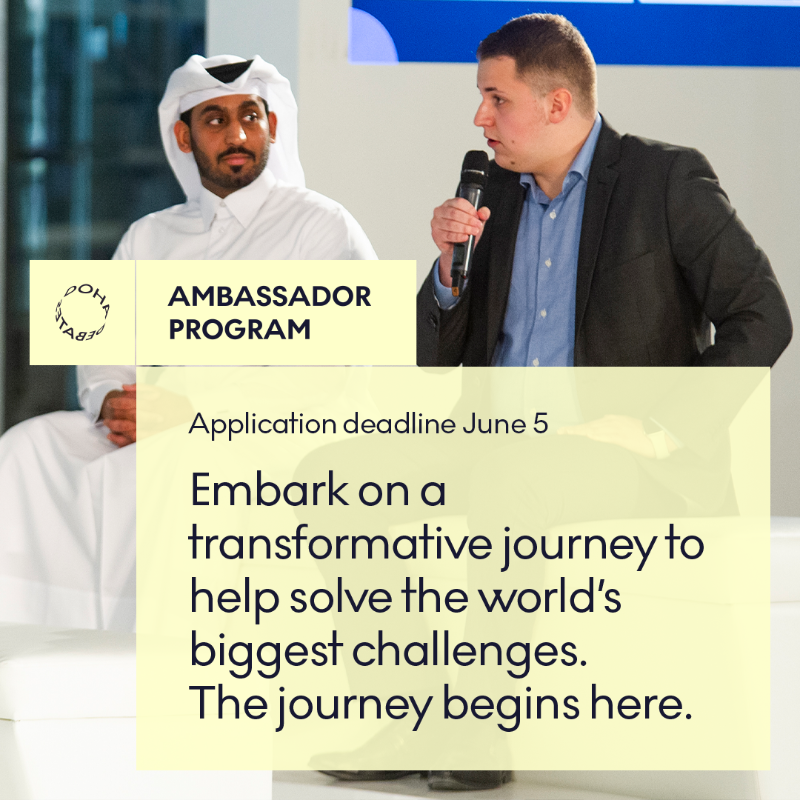The unique programme empowers participants to engage in productive conversations about the world’s most complex issues.
Up until last year, Nicolas Kamanzi was someone who avoided difficult conversations.
The young technology entrepreneur and activist, who lives in Uganda, struggled to listen to people who didn’t share his point of view—until he participated in the Doha Debates Ambassador Program.
The innovative programme, now open for applications until June 5, equips the next generation of leaders with the skills to engage in challenging conversations in a globally connected—yet increasingly polarised—world.
It is offered by Qatar Foundation’s Doha Debates, a media organisation whose award-winning programming and content helps young people bridge divides, resolve differences and work together to solve urgent global issues.
Led by international experts, a select group of young trailblazers spend 12 weeks learning how to productively discuss solutions to some of today’s most intractable problems.
Kamanzi, who was part of the first cohort of ambassadors in 2021, said that after engaging in the programme, he stopped shying away from potentially heated interactions. Recently, he was able to have a respectful, eye-opening conversation about gender equality with a colleague who had a very different perspective.
“[This colleague] actually used to call me a quitter when it comes to conversations like these, because I couldn’t spend even a minute listening to [the other person],” Kamanzi said. So during the conversation, he actively tried to apply what he’d learned, asking questions to find out why his colleague felt the way he did and listening without judgment.
“The Doha Debates Ambassador Program actually helped me to engage,” he said. “It was me trying to understand what he wanted to say, and also work together towards finding a common solution.”
Other former ambassadors echo the programme’s benefits, saying that the skills they learned have helped them navigate real-world conversations with people who hold different—or even opposing—beliefs.
Ahmed Daniyal Nawaz, a young Pakistani studying medicine in Qatar, was particularly struck by two pieces of advice given by international conflict resolution expert Dr. Govinda Clayton, who led a session for the ambassadors in 2021.
“Point number one was to differentiate the idea, or the point of discussion, from the person. So don’t think of them as one,” he recalled. “If you [hear] an idea that you’re against, don’t become against the person, and remember it is just the idea you’re discussing, not the person. And number two is: Go in the person’s shoes and think from their perspective.”
This advice rang in Nawaz’s ears when speaking with a friend, who told Nawaz that he was holding onto some resentment of an elderly family member and was reluctant to offer forgiveness.
“To me, [that] was very surprising and something that I would definitely not expect to hear,” Nawaz said. “Both of us come from the religion of Islam, and in our Islamic faith, respecting our elders is regarded with utmost importance.”
“But I didn’t directly go attack him, which probably I would’ve done beforehand. I didn’t oppose him. [And] once I got his backstory, his perspective, then I understood—OK, now I can see [why] he has those kind of feelings. And then after that I started to tell him what I think about the situation.”
A few days later, Nawaz received a message from the friend, who, as a result of their conversation, had decided to let go of his anger.
“That was really, really enriching,” said Nawaz. “I felt gratitude that I was able to make a change in someone’s life. And it happened during the time I was going through the Doha Debates Ambassador Program.”
What’s the Doha Debates Ambassador Program about?
This year’s programme runs virtually from August 31 to November 16.
Approximately 40 young leaders will tackle complex issues like climate change, gender equality and disability justice, guided by intercultural facilitation expert Dr. Brandon Ferderer and other international guest speakers.
Participants will also forge lifelong relationships with fellow changemakers from around the globe and have the opportunity to stay actively involved with Doha Debates. Former ambassadors have represented the organisation at their marquee debates and other events.
Several ambassadors were featured in the onstage audience at Doha Debates’ exclusive town hall conversation with Malala Yousafzai in March 2022. Guided by moderator British Afghan journalist Nelufar Hedayat, they were given the opportunity to ask questions of the renowned activist about the future of girls’ education in Afghanistan.
In November 2021, ambassadors Dana Al Ali, a Qatari student and environmental activist, and Muhammad Wasay Mir, a student at Northwestern University in Qatar, both appeared in the live debate Climate Change: Can we rise to the challenge?”. As active audience members, they posed thoughtful climate-related questions to the panelists: author and journalist Naomi Klein, academic and author Bjorn Lomborg and politician and biodiversity scientist Ameenah Gurib-Fakim.
Perhaps most compellingly, though, ambassadors have walked away with profound personal insights into the way they communicate, allowing them to approach challenging subjects with an open mind and heart as they try to find common ground with others who think or feel differently.
“The ambassadors programme taught me how to be mature and to know that sometimes, it’s not about what you know that matters, but your counterpart’s opinions as well,” Kamanzi concluded. “It’s not about who wins, but rather, what is true.”
The online application for the 2022 Doha Debates Ambassador Program is open to all fluent English speakers between the ages 18 and 24 who have consistent access to a computer for video conferencing.
Learn more and apply by June 5 at DohaDebates.com/Ambassador.







